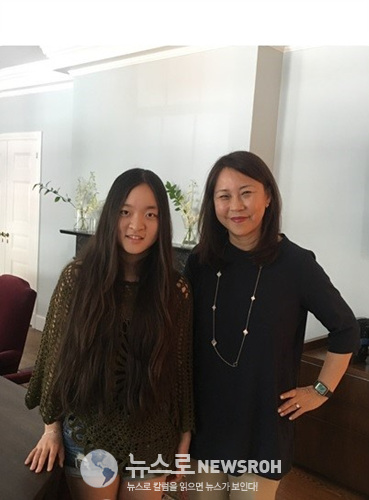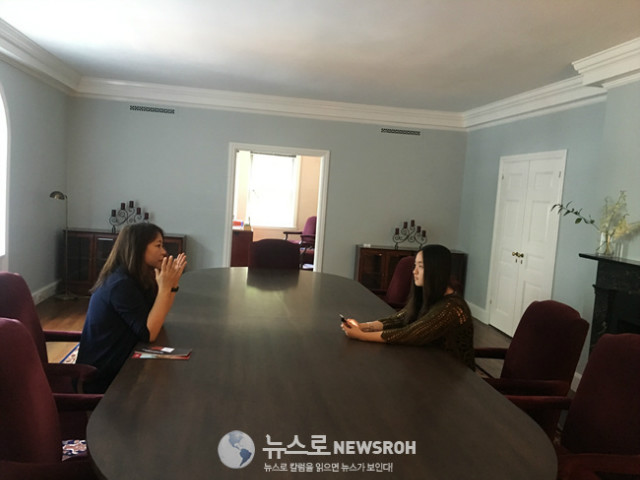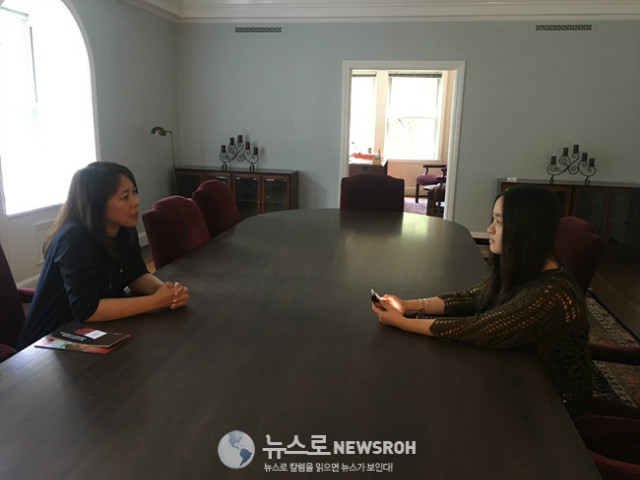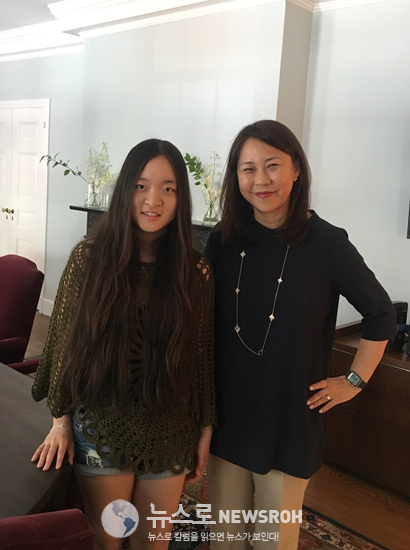New York. The smell of busy and polluted streets where people walked in a rapid staccato and breathed at their own pace. A place where reporters come in by day and night, in and out. A civilized state back in the 90’s where a lot of ethnic tension was present and proud Korean American, Kyung Yoon would start reporting for her evening news forecast in the shivery cold wearing a thick jacket with the mic in her hand.
The past week, I interviewed Kyung Yoon, a thriving and part-timely consistent reporter, and the executive director and member of the Korean American Community Foundation to get a better understanding of the reporting background and have a deeper look into the KACF because as a Korean American, I think it is very important for different ethnicities and cultures to be assimilated.
I have learned a lot of things from our interview session and since Mrs. Yoon is a wonderful mother and a wife who also keeps her priorities balanced in her life, she is defined to be successful in my view. Like a seed is first planted for a flower to grow, successful people starts out with an aim to reach and have a few people to look up to as their role model.
The same went along with Mrs. Yoon.
She remembers turning on the tv and seeing Connie Chung, a major Asian American broadcast reporter and anchor. It was a point of pride and aspiration for her along with countless other Asian Americans to “see somebody with the same skin color to be in a prominent position - a place of authority and information.”
“I think having a role model like Connie Chung - even if she never spoke to me directly - allowed young Asian Americans like me to dream about things that maybe we wouldn’t have been able to even consider.”

Mrs. Yoon says it’s challenging for immigrants or first-generations to grow aspirations, yet they try to overcome many barriers, both economically and culturally. A lot of them still worry about their survival in the country and the different culture like language can sometimes be an obstacle.
Even people like herself, Mrs. Yoon says it’s possible to inherit the same restrictive boundaries when chasing our ambitions because of the same survival mindset that we keep inside of us. To her, having a thriving mindset is “not worrying about the basics, but really thinking more broadly about what it means to not only receive but also give.” This mindset is what led her to be involved in the KACF, which is mainly focused on organization of the community and getting in touch with each other to give and receive what is important.
Mrs. Yoon then proudly says, “We, as Korean Americans, care about this - that’s what the case has been about.”
Although she is working on great projects with the KACF as the director and founding member, Mrs. Yoon is still a reporter on a very part-time basis. She is a contributing reporter on Asian American Life on CUNY tv, which is a national show most relevant to the Asian American communities. Reporting about a story per month, Mrs. Yoon says it’s been really nice to keep her toes in the reporting waters.
Yet, her reporting journey had its own timeline.
“When I was trying to get into television, the gates in were very, very narrow. You had to get in through one of the big networks and really there weren’t that many. It was just like NBC, CBS, ABC, FOX, and CNN. It was very limited.”
Now, as technology improved and new ideas came to mind, people find an easier way to put themselves out into the world.
“Today, that has all changed. You can basically record yourself and broadcast yourself on youtube. But then, the challenge is how you drive viewership. If you have like two views then it’s not that impactful. The thing about in the old days is that it was really hard to get in, but once you got in, you were guaranteed a big, big viewership because those were the only choices that people had. It’s a really kind of a different landscape.”
But on the negative side, because having that viewership is now more challenging, Mrs. Yoon says people became more sensational in order to get as much attention. For the 24-hour news cycle, getting something first was a competition besides the time and entertainment. This was absolutely true, because journalists and reporters would always “wait in line” to be first and then compete with each other by writing their stories in a way that attracts more attention which could include misleading titles. Even so, trying to get that attention has been getting more challenging as society changed. According to numerous articles, even celebrity scandals, with an average of 16 percent, fail to attract much attention. Events that disrupt everyday life such as war and terrorism has an average popularity of 41% - the highest in the hierarchy of story types. But, being first and having the most interesting story line didn’t mean having the most accurate information. That was another obstacle - audience demand was only one half of the marketplace for news. The other important half was the story and information - going through the chucks and balances, which a lot of reporters don’t have time for. For this reason, there’s a lot of fake news since anybody can put something up and share it to the world.
“I feel like as a consumer, you have to be more discriminating and to do more work, and to be more thoughtful and educated. You have to also question what it is that you’re being told in a way that’s very healthy. Maybe that is the positive side of all of this - that you don’t just become a passive consumer of information, but that you become one that is an active questioner and also very engaged in information and civic participation.”
However, very often, there are many journalists and reporters who make up stories and lies to attract more attention. Sometimes, hiding the truth and making up lies out to the world on live could hurt a person’s life, leading them to have to deal with consequences. I asked Mrs. Yoon what her opinion was upon those consequences and whether or not the news is responsible for them.
“Well, I think there’s a certain assumption there. I mean, you’re an artist and then you paint something and ten people will look at it and probably interpret it a little bit differently. It might be actually very different from what you were envisioning. Maybe somebody will see something that you hadn’t thought of. I don’t think it’s your responsibility once you create the piece that everybody has to see it the right way.”

Mrs. Yoon says it’s the same way with news sometimes and people throw back as well as give a lot of responsibility. But at the same time, she says there are responsibilities of the profession.
“It’s not about having to be responsible for how every single person might be interpreting but, you have responsibilities of being accurate, of being fair, and of being unbiased, and presenting information in a way that people can understand. I think that in any profession.”
In each and every profession, there are certain professional standards to follow. However, Mrs. Yoon says that a lot of that is not being followed today which is what we are all seeing now.
As the executive director and founding member of the KACF, I asked Mrs. Yoon how she brought up the idea of this foundation and what their goals were to maintain a good atmosphere and success. She goes back to when she was a news reporter, the time where this journey all began.
“When I was a news reporter - this is going back about twenty years like in the 90’s in New York - there was a time where I saw a lot of ethnic tension in New York City. Particularly between Korean Americans and African American Communities. There were a lot of boycotts, Koreans in grocery stores, etc. It wasn’t just NY - it was actually happening around the country, that’s what really exploded in the LA riots and so on.”
She brings this up because as a reporter, she remembers seeing a lack of voice in the Korean Community. There was a lot of work to do in terms of building an articulate voice for the community. She never thought of doing this herself but she remembers thinking that the community of her culture needed to do some work.
Going into about 2002 when Mrs. Yoon helped to start the KACF, part of it was recognizing the same dreams for their own children such as being successful in America but she says it was a very individualized success formula. She says that in some ways thinking about their self possessions and success only would cause more competition against each other for the limited opportunities that Asian Americans can have in this country. Their main goal for KACF was rather the opposite.
“Really we thought of creating our community foundation so that we can leverage our voices and our generosity and giving back to help vulnerable members of our community, knowing that for many of us who are blessed to even be in a position to be thinking about contributing or giving back.”
The KACF wanted to create a circle of receiving but giving and keeping in mind that “one person, no matter how big their voice is, it’s not as loud as if a thousand of us are saying the same thing.”
Mrs. Yoon, a proud Korean American like me, knows what we mean when we talk about “racial slurs.” It’s a typical type of teasing that almost every Asian American has to deal with when growing up in a non-asian or suburban community. I asked her about some of the things she had to deal with and how she feels about them now.
“I remember getting a lot of teasing, especially about my name (the kids couldn’t even pronounce it). I actually took an American name, it’s Karen. I used that name but it wasn’t official - I just called myself that. But, in college I decided to go back to my Korean name because, I felt that was much more of who I am more than anything.”
Years later, when she became a television news reporter, some people advised her to use Karen Yoon for the television name. But after much thought, she decided to use Kyung Yoon. She wanted to show people, especially the bullies if they get to watch her, that she can be a proud Korean American with a “funny name.” She says it’s about our entire being and of who we are as Americans.
“I think for me that has been the journey and also for my small contribution to wanting to push back on any assumptions that we are somehow always the perpetual foreigners. I think that it’s really important that we feel empowered and be able to assert that we are here in America - this is our home. We have much right to be here.”
For her, America was a very marginalized place growing up, because they were the only Asian family in the neighborhood. With KACF, it’s all about creating a better atmosphere and trying to assimilate different cultures and turning them into something amazing.
“We are creating this wonderful community and it’s really not just about people who can contribute, it’s really about our grantee partners - the ones that are doing a lot of important work on the ground, being the social safety net for the most vulnerable Korean Americans, and really being a partner to each other so that we can build a stronger community.”
The younger generations of Asian Americans, specifically Korean Americans, still have feelings of isolation because of their distant culture. For Mrs. Yoon, she thinks this has improved compared to her generation growing up.
“I think for new generations it’s less and less distant. When I was growing up, Korea was very poor and very distant. It cost a lot of money to make a long-distance phone call. I think the world has gotten much closer now through technology.”
She doesn’t even have to go so far into proving this - looking at her own children she sees the Samsung phones that they are using, Kpop that they are listening to, and a lot of other things that are “coming from Korea that are really admired by Americans and by the world.” Even economically, Korea has been improving to come up really well as time progressed.
“That said, I know it’s not about not being Korean or American, it’s about who we are which is made to be positives that we can take a lot of the work ethic, the values of being Korean American, but also being able to incorporate what it means to grow up in a country like America for all of its flaws but also its pluses.”

To finalize our interview, I asked her the question where most reporters and journalists are all looking the answers for. To hear the answer from Mrs. Yoon is a dream come true and for this, she motivated aspiring reporters as well as the audience in simplicity about working hard and keeping it going regardless of the pain.
“I think my advice would be that there is a whole aspect of being excellent and working really hard to be the best in whatever and have skills whether you’re a journalist, plumber, doctor, or social entrepreneur. That part is important but what I would say is to really develop the soft skills.”
The soft skills that she mentions are things that are about “networking, responding to emails, and being interested in making connections with people to create that openness.”
“I think that’s how often people are sharing information or job tips. I really would say that sometimes I think - and I’m the same way - our comfort level might be much more around studying really hard and getting a 100 in a test. But, get yourself out of your comfort zone.”
Even though it might feel terrifying to create a conversation with someone you’ve never met before, Mrs Yoon says that those kind of “push yourself out of your comfort zones” is part of developing. She says it’s great to make a relationship by starting a conversation with someone you haven’t met, get a business card, and follow up or write a personal note. It’s a chance worth having and it’ll be regretful to throw that opportunity away.
“It’s not about who has the most Facebook friends - it’s really about something deeper than that. That would be my advice because I feel like in the age that we live in, it’s not about technical expertise - that’s a given. Instead, it’s really about those kinds of soft skills.”
Mrs. Yoon shared her voice with me that day without the mic in her hand and spent her time to share the important information that seems to miss out a lot in society today and to give an embodiment of what it means to be a reporter and founding member of the KACF. Giving those tips and motivations, she advises to make connections, to learn, and to remember that “giving is much as important as receiving.” In the end, Mrs. Yoon wants us to be loud and get out there, and to share our voices without having to use the mic in our hand.


